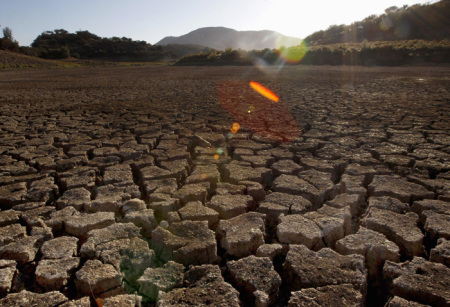Why the Religious Community Supports a Republican Climate Resolution

With this week's Executive Order designed to dismantle Obama's climate legacy, there are plenty of reasons for climate advocates to despair and feel despondent. However, many in the religious community are hopeful that a new dawn of bipartisanship has occurred in Congress, which will create a space for dialogue and solutions to protect communities and allow God's creation to flourish.
This hope stems from the Republican Climate Resolution, which was introduced on March 15th by 17 House Republicans. This resolution, led by Rep. Elise Stefanik (NY-21), Rep. Carlos Curbelo (FL-26), and Rep. Ryan Costello (PA-6), represents a disruption in the partisan narrative on climate change, and demonstrates a moral shift in our national politics.
The resolution, H. Res. 195, affirms that climate change is real, human-caused, and needs to be addressed by Congress. It also demonstrates that there is political will from both political parties to act.
As Rep. Costello stated in an article in The Atlantic earlier this month, supporting the resolution "was the right thing to do." That moral underpinning, harkening to faith values, is the reason that the resolution has the broad backing of a diverse coalition of religious organizations.
In fact, the resolution's origins in the 114th Congress can be traced back to an interfaith delegation that in September 2014 first asked former congressman Chris Gibson (NY-19) to draft and introduce a climate resolution. The group of grassroots lobbyists "wondered whether Rep. Gibson could be persuaded to take a moral stand based on his own Catholic faith," and were delighted to find that he was "a faithful custodian of our world."
Now, the reintroduction of this Republican Climate Resolution in the 115th Congress boasts the broad support of over 50 religious leaders and organizations, including voices ranging from Evangelical to Catholic, Jewish to Quaker.
What unites them? In a letter sent earlier this month to Congress, 35 national religious leaders wrote that "we are rooted in the practice of emphasizing our common values in order to advance cooperation and overcome partisanship."
A separate letter, signed by 16 national Catholic institutions, quotes Catholic Social Teaching and states their commitment to "protect human life and dignity, to prioritize the needs of poor and vulnerable peoples, and to care for God's creation of which we are a part."
The resolution appeals to religious communities primarily because many people of faith feel called to pray and work to overcome divisions that have prevented climate action. According to Diane Randall, Executive Secretary of the Friends Committee on National Legislation, the resolution demonstrates that "our moral obligation to address climate change and protect vulnerable communities transcends partisanship."
Pope Francis states in his environmental encyclical Laudato Si:
"I urgently appeal, then, for a new dialogue about how we are shaping the future of our planet. We need a conversation which includes everyone, since the environmental challenge we are undergoing, and its human roots, concern and affect us all."
In a time of uncertainty for our climate, we look towards these 17 Republican cosponsors to lead a new dialogue in Congress on climate action. It's time for them to introduce meaningful legislation. It's time for them to protect key climate finance, science, and research.
What a perfect opportunity for legislators reeling from the uncomfortable partisanship of the past few months to show their commitment to meaningful bipartisan climate action. Yes, supporting this resolution is indeed "the right thing to do."





















